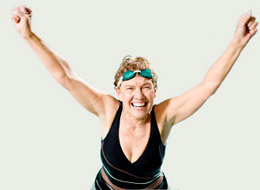What is our immune system? What can I do to boost it?
Posted in General Health & Wellness on April 21, 2011. Last modified on October 29, 2020. Read disclaimer.
Are you constantly battling coughs or colds? Do you feel tired all the time? Part of the problem may be a weakend or overactive immune system -- that complicated line of defenses your body has for keeping you healthy and safe from bacteria, viruses, fungi, toxins and other internal and environmental threats.
+ Free Shipping & Returns on Eligible Items.
(*Amazon's Top 100 list updated hourly.)
The immune system can actually be broken down into two basic branches. The first is our innate immune system, consisting of skin, mucous membranes, saliva, tears, sweat, urine, fever, inflammation and the non-specific defenses we were born with. The second is our adaptive or acquired defenses such as T-cells, B-cells and antibodies which are uniquely developed to remember, recognize and attack specific microbes.
Many factors may weaken our immunity
These include:
- Smoking and excessive alcohol consumption
- A diet that is high in fat but deficient in protein, vitamins, minerals and fiber
- Sedentary lifestyle
- Obesity
- Situational and chronic stress -- whether it be psychological, social or physical
- Inadequate or poor quality sleep
- Poor hygiene and high-risk social patterns -- like working in close contact with others who may be ill
- Genetics
- Not managing a disease -- such as diabetes, high blood pressure or HIV/AIDS
Age is another important consideration
Though researches are not certain exactly why our immune system becomes less effective as we get older, suspected factors include:
- our thymus produces fewer infection-fighting T-cells.
- the bone marrow in seniors produces fewer stem cells.
- the sentinel cells of our immune system, those responsible for recognizing and reacting to specific threats we've encountered in the past, begin to die off sooner than when we are younger.
- the elderly tend to eat not only less food overall, but also less variety. As a result, they are more at risk for vitamin and trace mineral malnutrition.
The role of exercise and immunity

One lifestyle factor that is both within our control and believed to support a strong immune system is regular, moderate exercise -- of any form. Exercise not only helps us manage stress, keep our weight in check and supports heart and lung health, but it also activates the body to produce more antibodies and increases the circulation of immune and lymphatic system cells and substances -- which enables them to more effectively attack bacteria. Furthermore, some research suggests that this improved immune response may even help fight cancer cells.
How much exercise is enough to support our immune function? Actually, the physical activity needed to support a healthy immune system can be less intense and of shorter duration than what you may think. Just 20-30 minutes of brisk walking, relaxed swimming or moderate bicycling, five days a week, is sufficient. Of course, persons with medical concerns should please talk with their doctor before beginning any exercise regimen.
Source: Chapter 14: The Immune System
From the Research Desk...
Exercise can help reduce stress-related aging of cells
San Francisco, California: Brief exercise may help protect cells from stress-induced aging, say researchers from the University of California, San Francisco (UCSV).
They discovered that as little as 42 minutes of daily exercise over a 3-day period can help protect against the effects of stress on telomere length. (Telomeres are pieces of DNA on the tips of chromosomes that act as protective sheaths, keeping the chromosomes from unraveling.) Previous research has shown that stress can affect the length of telomeres; short telomeres have been linked to a variety of health problems, including coronary heart disease, diabetes and early death.

"Telomere length is increasingly considered a biological marker of the accumulated wear and tear of living, integrating genetic influences, lifestyle behaviors, and stress," said Elissa Epel, PhD, one of the lead investigators and an associate professor in the UCSF Department of Psychiatry. "Even a moderate amount of vigorous exercise appears to provide a critical amount of protection for the telomeres."
Atlanta Tips for Healthy Living...

Five ways to overcome the procrastination habit, enjoy better mental focus, and get more done
Are you a last-minute person? Do you put things off until they become urgent? Procrastination can come disguised in many ways but it always includes waiting until the last possible minute to do something. (Just as a side note, some people do in fact work best under pressure and their tendency to procrastinate works in their favor.)
However, most people dislike the feelings that come along with doing things at the last minute under pressure. They feel stressed! They feel bad for not having control over their emotions and actions. If this applies to you it is time to go to work on changing this habit. It can be done -- and following these steps can help:
- Get organized. Being disorganized leads to chaos and feeling overwhelmed. Start by tidying up and organizing your life.
- Focus on your goals. In the hectic world we're living in, it's easy to become so burdened with tasks that we don't know where to start. Take time to list down all the tasks and sort out those that are important in accomplishing your goals.
- Take baby steps. The smaller steps aren't as intimidating and facilitate getting started. If a project can't be completed a little at a time over several days, keep up your momentum by focusing only on the next doable step.
- Set deadlines. This is very important because nothing gets done if there is no deadline. Deadlines will give you a sense of urgency to take action. Reward yourself when you complete a task or a project.
- Stay motivated. There are many things you can do to stay motivated. First, you must have a goal or desire to succeed. You can read books that are inspirational, paste motivational quotes around where you can see them, listen to upbeat music, attend seminars and hang around with people who are positive.
You have the power and the ability to conquer procrastination. Follow these simple steps, and you're sure to break out of the endless cycle of procrastination.
Source: VitaJournal, April 2011. Judy Ellison, Ph.D., is a psychologist, author and motivational speaker, She has inspired people around the world to reach within and find their passionate purpose to live a more meaningful life.

 Exercise and your immune system
Exercise and your immune system Flesh-eating bacteria in Georgia river
Flesh-eating bacteria in Georgia river Flesh-eating bacteria infographic
Flesh-eating bacteria infographic How to control chronic inflammation
How to control chronic inflammation How to stop worrying
How to stop worrying Strength or endurance exercise?
Strength or endurance exercise? Controlling stress in the workplace
Controlling stress in the workplace Special nutritional needs of children
Special nutritional needs of children Healthy alternatives to soft drinks
Healthy alternatives to soft drinks Small space gardening
Small space gardening Preventing falls in the home
Preventing falls in the home Refreshing, fizzy fruit drink recipes
Refreshing, fizzy fruit drink recipes Ancient lessons for modern living
Ancient lessons for modern living